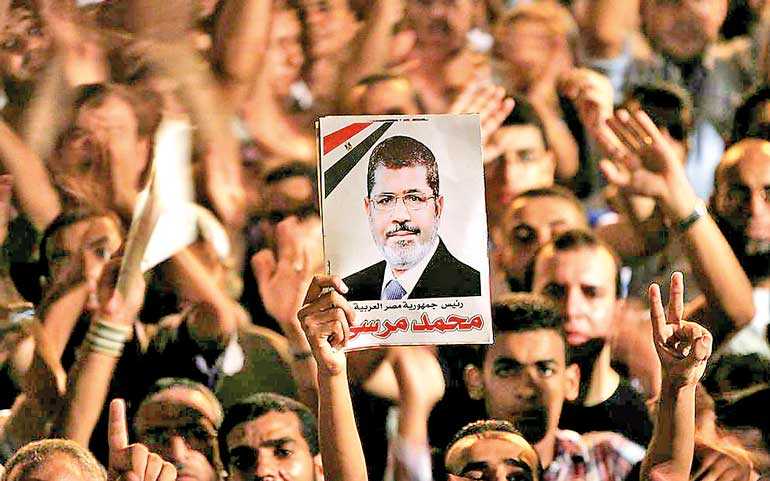Monday Feb 23, 2026
Monday Feb 23, 2026
Wednesday, 19 June 2019 00:00 - - {{hitsCtrl.values.hits}}

A picture of Egypt's first Islamist President Mohamed Mursi is held up as supporters cheer during a rally at Tahrir Square in Cairo 13 July, 2012 - Reuters
CAIRO (Reuters): Former Egyptian President Mohamed Mursi, the first democratically elected head of state in Egypt’s modern history, died on Monday from a heart attack after collapsing in a Cairo court while on trial on espionage charges, authorities and a medical source said.
The 67-year-old Mursi, a top figure in the now-banned Muslim Brotherhood, had been in jail since being toppled by the military in 2013 after barely a year in power, following mass protests against his rule.
His death is likely to pile up international pressure on the Egyptian Government over its human rights record, especially conditions in prisons where thousands of Islamists and secular activists are held. The public prosecutor said Mursi had collapsed in a defendants’ cage in the courtroom shortly after addressing the court, and was pronounced dead in hospital at 4.50 p.m. (1450 GMT). It said initial checks had shown no signs of recent injury on his body.
The Muslim Brotherhood described Mursi’s death as a “full-fledged murder” and called for masses to gather at his funeral in Egypt and outside Egyptian embassies around the world.Mursi’s family previously said his health had deteriorated in prison and that they were rarely allowed to visit. A medical source said Mursi died of a heart attack.
The source said Mursi, who was diabetic and suffered from high blood pressure, had received medical treatment at a private hospital and at the police hospital in Cairo, denying that he was deprived from medical attention.
Amnesty International called for an “impartial, thorough and transparent” investigation into Mursi’s death. “Egyptian authorities had the responsibility to ensure that, as a detainee, he had access to proper medical care,” the group said in a statement.
After decades of repression under Egyptian autocrats, the Brotherhood won a parliamentary election after a popular uprising toppled Hosni Mubarak and his military-backed establishment in 2011. Mursi was elected to power in 2012 in Egypt’s first free Presidential Election, having been thrown into the race at the last moment by the disqualification on a technicality of millionaire businessman Khairat al-Shater, by far the Brotherhood’s preferred choice.